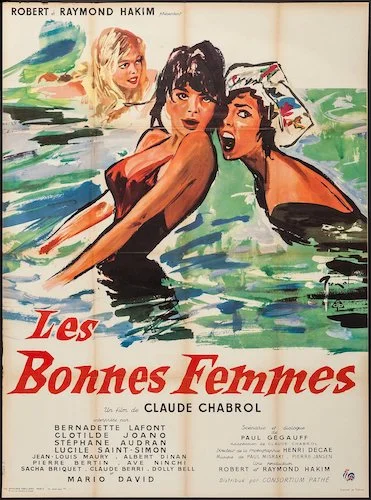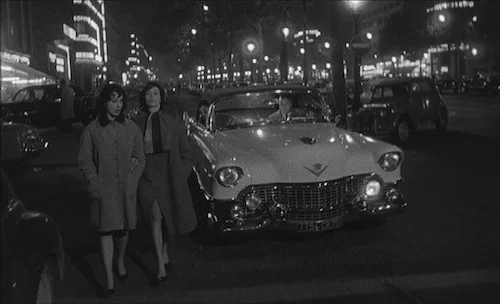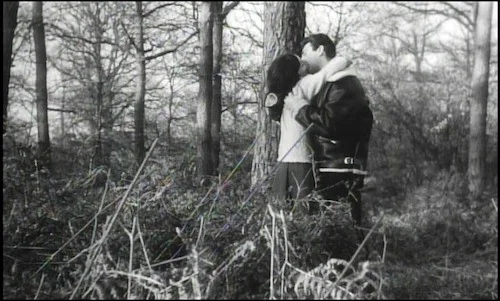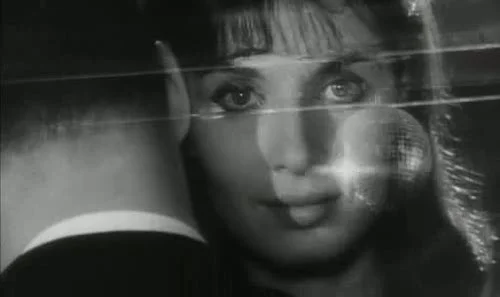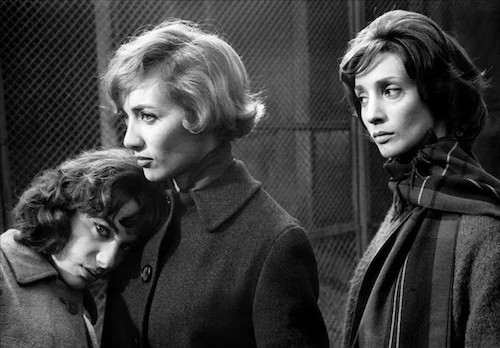Les Bonnes Femmes: On-This-Day Thursday
Every Thursday, an older film released on this opening weekend years ago will be reviewed. They can be classics, or simply popular films that happened to be released to the world on the same date.
For April 22nd, we are going to have a look at Les Bonnes Femmes.
The French New Wave movement is a movement that many cinephiles find themselves addicted to when first discovered. Despite being a style that sought to change cinema, there is still a uniform feel between these films. Coldness. Dry humour. Poetry found in disruption. The masters of this movement did not want to ruin film, as much as they wanted to point out what it was actually capable of. Agnès Varda used film as a message: one that could shed perspectives on the medium and society together. Then came the filmmakers that stemmed from the groundbreaking journal Cahiers du cinéma: a paper catered to critiquing film on a challenging level.
You have famous names like Jean-Luc Godard (who favoured technical discomfort) and François Truffaut (who found beauty in the little things). We have the lesser known Claude Chabrol, whose smaller success may have come from the notoriety surrounding his grand jewel Les Bonnes Femmes. A box office disaster that sparked outrage and distaste, this film never quite took off the ground. Its premiere didn't go well either: this includes many premature walk outs, and an actual fist fight with a patron and Chabrol. Broken chairs. Critical spitting. The goal of the French New Wave era was to change cinema, but Les Bonnes Femmes may have gone too far.
An early scene, which showcases the stylish cinematography.
Why did this film spark such an outrage? I'd argue that this film still hasn't quite experienced a turn around. Sure, film academics and critics are starting to discuss it finally, but the cult status that Varda or Rohmer works are experiencing are definitely much stronger. The film is also difficult to get a hold of, with a Kino DVD release being the best copy you can view in North America currently.
Maybe it's because the film has a number of differing things to say about one subject: the mistreatment of women. Nowadays, you can argue that the film may be more vicious and unrelenting through a male director's perspective (as if the masculine savagery is stronger than the understanding of women). There might be a misunderstanding: that Chabrol enjoys seeing women being miserable. I don't get that notion at all. I instead see a filmmaker that may have tried too hard to make a case using his own perceptions. He certainly had tried to make female empowering films on more than one occasion, including the queer drama Les Biches.
That's kind of why Les Bonnes Femmes works. Its melodramatic approach to creating a feminist experience is one that may sit less well than a Varda film (or any of the feminist waves of films coming out of various countries, like the Czech Republic around that time). France was also releasing its own feminist films from other filmmakers. A drastic mood was meant to be achieved. Maybe the jarring end result is what made the whole experiment ugly at the time.
A shot from the most shocking scene of the film.
With age, and the continued experimentation with the French New Wave's ways, comes a rejuvenation for this film. The near-voyeuristic lengthy shots (the four female leads at the public pool). The listening-in on private conversations (the four coworkers discussing their social lives). The desire to date men, when the majority shown in the film are toxic. All of these are met with specific film techniques, including mismatched scene transitions, awkward pauses, and glamorous cinematography.
The mission to find love is glorified. The mission to find love has numerous viable avenues. This is the chasing of the kinds of shallow dreams many female characters were being given in Hollywood films at the time. Women were made damsels in distress, heart dreamers, or support for male figures. Les Bonnes Femmes is almost a desecration of these stereotypes.
Four friends (some through their careers) are tied to their dating lives in this film. Their work and social lives get tangled up, as if all four of them are at dead ends with important parts of their lives. We explore uncomfortable dates, extensive flirts, and the pursuit of the dream partner. This chase results in the most definitive moment of the film: a grizzly conclusion that fades into the dreamy evening of another.
The haunting final shot.
It is so difficult to pinpoint what exactly feels perfect about Les Bonnes Femmes. It's one of those instances where the planning is destined for failure, but the fulfillment is indescribable. The film is as brash as it is quiet. As confident as it is reserved. As hasty as it is patient. These aren't always the comparisons between two moments in the film, but occasionally descriptions of single scenes.
Les Bonnes Femmes doesn't break rules, make rules, or play by rules. It exists in a world where the very concept was never intended. It's like music created by someone who has never learned what notes were (let alone how to read sheet music). It is never overly experimental, but it sure is anything but orthodox. Out of all of the Cahiers du cinéma alumni, Chabrol had the quietest voice (but he still certainly had something to say).
Some of the leads together.
This is a Hollywood romantic limbo; one where dates succeed and fail simultaneously. The image of projected love can be fatal. A creation of romance in film is detrimental more than beneficial. Maybe that's why Les Bonnes Femmes initially failed. It didn't have an answer as to how love should be portrayed, because it results in the harm of the female character. These depictions were created by men, even as a means of representing women. They were destined to fail; naturally, Les Bonnes Femmes did so, too.
Andreas Babiolakis has a Masters degree in Film and Photography Preservation and Collections management from Ryerson University, as well as a Bachelors degree in Cinema Studies from York University. His favourite times of year are the Criterion Collection flash sales and the annual Toronto International Film Festival.

